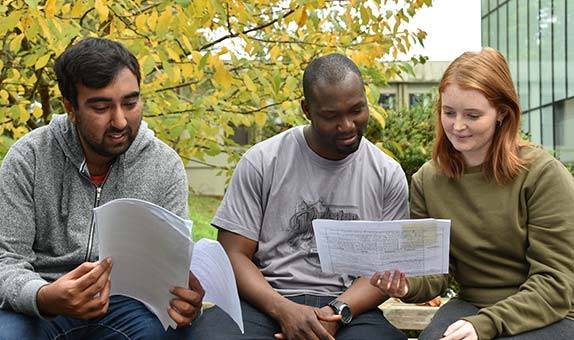How Can I Get a full Scholarship in the UK?
Obtaining a full scholarship in the UK can be a life-changing opportunity for many students. The process may seem daunting, but with the right guidance and preparation, it is possible to secure financial aid that covers your tuition and living expenses.
This article provides a comprehensive guide on how to get a full scholarship in the UK, covering the types of scholarships available, eligibility criteria, application processes, and tips for success.
Table of Contents
What is a Scholarship in the UK?
A scholarship is a form of financial aid awarded to students to help them pursue their education without the burden of tuition fees and other related costs. Scholarships are often granted based on various criteria, including academic merit, financial need, leadership potential, and extracurricular involvement. In the UK, scholarships are available from a wide range of sources, including government programs, universities, private organizations, and charitable foundations.
Importance of Scholarships
Scholarships play a crucial role in making higher education accessible to students from diverse backgrounds. They provide financial relief to students who might otherwise be unable to afford the high costs associated with higher education. Scholarships also recognize and reward academic excellence, encouraging students to strive for their best. Moreover, they foster diversity within the student community, bringing together individuals from various cultural, economic, and social backgrounds.
Unconventional Scholarships in the UK
While most scholarships focus on academic excellence or financial need, there are also unconventional scholarships that cater to unique talents, backgrounds, or interests. Here are some examples:
Sports Scholarships
Several UK universities offer sports scholarships to students who excel in various sports. These scholarships not only provide financial assistance but also offer specialized training, access to sports facilities, and support from professional coaches.
Creative Arts Scholarships
For students in the fields of music, art, drama, and design, there are scholarships that recognize creative talent. These scholarships often cover tuition fees and provide additional resources such as studio space, art supplies, or musical instruments.
Community Service Scholarships
Some scholarships are awarded to students who have demonstrated a commitment to community service and volunteer work. These scholarships aim to support students who are making a positive impact in their communities and encourage them to continue their efforts.
Scholarships for Underrepresented Groups
To promote diversity and inclusion, there are scholarships specifically designed for underrepresented groups. These may include scholarships for women in STEM, ethnic minorities, LGBTQ+ students, and students with disabilities.

The Role of Corporate Scholarships
Many corporations and businesses offer scholarships as part of their corporate social responsibility (CSR) initiatives. These scholarships can be a win-win situation for both the student and the corporation. Here’s how:
Investing in Future Talent
By offering scholarships, corporations invest in the development of future talent. This is particularly beneficial for industries that require highly skilled professionals. Companies can nurture potential employees from an early stage, ensuring they have the skills and education needed to succeed in their field.
Building Brand Loyalty
Scholarship recipients often develop a sense of loyalty and gratitude towards the sponsoring company. This can lead to a long-term relationship where the student may choose to work for the company after graduation, bringing their skills and knowledge to the organization.
Enhancing Corporate Reputation
Offering scholarships helps corporations build a positive reputation and demonstrate their commitment to social responsibility. It shows that the company is invested in the community and the development of the next generation.
Types of Scholarships Available in the UK
Government-Funded Scholarships
The UK government offers several scholarship programs to international students. These scholarships are highly competitive and aim to attract the best and brightest students from around the world.
Chevening Scholarships
Chevening Scholarships are awarded to outstanding emerging leaders from around the world to pursue a one-year master’s degree in any subject at any UK university. The scholarship covers tuition fees, living expenses, and travel costs.
Commonwealth Scholarships
Commonwealth Scholarships are available to students from Commonwealth countries. These scholarships cover master’s and PhD programs, and they aim to develop skills and knowledge that will contribute to the development of the student’s home country.
University-Specific Scholarships
Many UK universities offer their own scholarship programs to attract talented students. These scholarships can be either merit-based or need-based.
University of Oxford Scholarships
The University of Oxford offers several scholarships, including the Clarendon Fund, which provides fully funded scholarships to academically excellent students from all over the world.
University of Cambridge Scholarships
The University of Cambridge offers various scholarships, such as the Gates Cambridge Scholarship, which covers the full cost of studying at Cambridge, including tuition fees and living expenses.
Private and Non-Governmental Scholarships
Various private organizations and NGOs offer scholarships to international students. These scholarships often have specific eligibility criteria and application processes.
British Council Scholarships
The British Council offers a range of scholarships, including the GREAT Scholarships, which are available to students from specific countries and cover tuition fees for a wide range of subjects.
Rotary Foundation Global Grant Scholarships
The Rotary Foundation offers scholarships to students pursuing graduate-level coursework or research in areas of focus such as peace and conflict prevention, disease prevention, and economic development.

Eligibility Criteria for Scholarships in the UK
Each scholarship has its own set of eligibility criteria. However, there are common requirements that most scholarships share.
Academic Excellence
Most scholarships require applicants to have a strong academic record. This often means having a high GPA, top grades, or equivalent academic achievements.
English Language Proficiency
Since English is the primary language of instruction in the UK, most scholarships require applicants to demonstrate proficiency in English. This can be done through standardized tests such as IELTS or TOEFL.
Leadership and Extracurricular Activities
Many scholarships, especially those aimed at emerging leaders, look for candidates who have demonstrated leadership skills and have been actively involved in extracurricular activities.
Financial Need
Need-based scholarships require applicants to demonstrate financial need. This usually involves providing detailed information about their financial situation and explaining why they need financial assistance.
Application Process for UK Scholarships
The application process for scholarships in the UK can be competitive and rigorous. Here are the steps to follow to increase your chances of success.
Research and Identify Suitable Scholarships
Start by researching the scholarships that you are eligible for. Make a list of scholarships that match your academic background, interests, and career goals. Websites of UK universities, the British Council, and scholarship databases are good places to start.
Prepare Required Documents
Most scholarship applications require a set of documents. Commonly required documents include:
- Academic transcripts: Certified copies of your academic records.
- Proof of English language proficiency: Test scores from IELTS, TOEFL, or other recognized English language tests.
- Personal statement or essay: A written statement explaining your academic achievements, career goals, and reasons for choosing the specific program and university.
- Letters of recommendation: References from professors, employers, or other individuals who can attest to your academic and personal qualities.
- Financial documents: Proof of financial need, such as bank statements, tax returns, or other financial records.
Write a Strong Personal Statement
Your statement is a critical part of your scholarship application. It should highlight your academic achievements, career goals, and reasons for choosing the specific program and university. Be sure to tailor your statement to each scholarship you apply for.
Obtain Strong Letters of Recommendation
Letters of recommendation from professors or employers can strengthen your application. Choose recommenders who know you well and can speak to your academic abilities and personal qualities.
Submit Your Application
Make sure to submit your application before the deadline. Late applications are usually not considered. Keep track of the deadlines for each scholarship and plan your application process accordingly.
Prepare for Interviews
Some scholarships require an interview as part of the selection process. Prepare for interviews by practicing common questions, researching the scholarship provider, and being ready to discuss your academic background and career goals.

The Historical Evolution of Scholarships in the UK
The concept of scholarships has a long and rich history in the UK. Over the centuries, scholarships have evolved from exclusive privileges for the elite to inclusive opportunities for a diverse range of students. Understanding this evolution provides insight into the current landscape of scholarships and their ongoing significance.
Medieval and Renaissance Periods
During the medieval period, education was primarily accessible to the clergy and the nobility. The earliest scholarships were often associated with religious institutions and monastic schools, where promising students were supported in their studies to become priests or scholars.
In the Renaissance period, the establishment of colleges at Oxford and Cambridge introduced more formalized scholarship programs. Wealthy patrons, including monarchs and nobles, endowed these colleges with funds to support poor scholars, who were typically male students of notable intellect but limited financial means.
The 19th Century
The 19th century marked significant changes in the UK’s educational system. The Industrial Revolution brought about economic and social transformations, increasing the demand for educated professionals. During this period, philanthropy and social reform movements gained momentum, leading to the establishment of scholarships aimed at broadening access to education.
Prominent educational reformers and philanthropists, such as Thomas Holloway and John Owens, founded institutions and scholarship programs to support students from less privileged backgrounds. The introduction of the Elementary Education Act 1870, which made education compulsory for children aged 5-12, also contributed to a growing recognition of the need for financial assistance to help talented students continue their education.
The 20th Century
The 20th century saw the expansion of scholarship programs and a shift towards inclusivity. The introduction of the Welfare State after World War II and the establishment of the University Grants Committee in 1919 played crucial roles in supporting higher education.
Post-war Britain witnessed a surge in the creation of public and private scholarships aimed at promoting social mobility and economic development. The introduction of the Education Act of 1944, also known as the Butler Act, further emphasized the importance of education for all, leading to the expansion of scholarship opportunities.
The Late 20th and Early 21st Centuries
With the advent of globalization, the UK’s higher education sector has become increasingly international. Universities and governments recognized the value of attracting global talent, leading to the establishment of scholarships for international students.
In recent decades, there has been a concerted effort to promote diversity and inclusion through scholarship programs. Scholarships targeting underrepresented groups, including women in STEM fields, ethnic minorities, and students with disabilities, have become more prevalent.

Innovative Scholarship Models
Income-Share Agreements
Income-Share Agreements (ISAs) are an innovative approach to funding education. Under an ISA, students receive financial support for their education in exchange for agreeing to pay a percentage of their future income for a set period. This model shifts the financial risk from the student to the funder and aligns the interests of both parties.
Crowdfunded Scholarships
Crowdfunding has emerged as a modern way to support students’ educational journeys. Platforms like GoFundMe and Kickstarter allow individuals to raise funds for their education by sharing their stories and attracting donations from a broad audience. Crowdfunded scholarships can provide a lifeline for students who may not qualify for traditional scholarships.
Corporate Partnerships and Apprenticeships
Corporate partnerships and apprenticeships combine education with practical work experience. Companies sponsor students’ education in exchange for a commitment to work for the company after graduation. This model benefits both students and employers, as students gain valuable experience and employers secure a pipeline of skilled workers.
Micro-Scholarships
Micro-scholarships are small financial awards given for specific achievements or milestones, such as maintaining a high GPA, participating in extracurricular activities, or completing a community service project. These scholarships can be awarded frequently and provide ongoing motivation for students to excel in various areas.
The Psychological and Social Impact of Scholarships
Boosting Confidence and Motivation
Receiving a scholarship can significantly boost a student’s confidence and motivation. Knowing that their hard work and achievements are recognized and valued encourages students to continue striving for excellence.
Reducing Stress and Financial Anxiety
Scholarships alleviate the financial burden of education, reducing stress and anxiety related to tuition fees and living expenses. This financial relief allows students to focus more on their studies and personal development.
Fostering a Sense of Belonging
Scholarship recipients often become part of a community of scholars, providing a sense of belonging and support. Networking opportunities, mentorship programs, and alumni associations help students build valuable connections and feel integrated into the academic community.
Encouraging Philanthropy and Giving Back
Many scholarship recipients are inspired to give back to their communities and support future generations of students. This cycle of philanthropy ensures the sustainability of scholarship programs and the continued support of talented individuals.
Private and Non-Governmental Scholarships
British Council Scholarships
The British Council offers a variety of scholarships to international students, including the GREAT Scholarships.
GREAT Scholarships:
These scholarships are available to students from specific countries and cover tuition fees for a wide range of subjects.
Eligibility Criteria:
- Be a citizen of an eligible country.
- Meet the academic requirements of the chosen university course.
- Demonstrate a strong interest in the chosen field of study.
Rotary Foundation Global Grant Scholarships
The Rotary Foundation offers scholarships for graduate-level coursework or research in areas such as peace and conflict prevention, disease prevention, water and sanitation, maternal and child health, education, and economic development.
Eligibility Criteria:
- Be sponsored by a Rotary club or district.
- Pursue studies in one of the Rotary’s areas of focus.
- Demonstrate academic excellence and a commitment to community service.

Case Studies of Successful Scholarship Programs
Rhodes Scholarship
The Rhodes Scholarship, established in 1902, is one of the most prestigious international scholarship programs. It has supported thousands of students from around the world to study at the University of Oxford. Recipients, known as Rhodes Scholars, are selected based on their academic achievements, leadership qualities, and commitment to making a difference in the world.
Gates Cambridge Scholarship
Funded by the Bill and Melinda Gates Foundation, the Gates Cambridge Scholarship program was established in 2000. It aims to build a global network of future leaders committed to improving the lives of others. Scholars are selected for their intellectual ability, leadership capacity, and desire to contribute to society.
Fulbright Awards
The Fulbright Program, which operates in over 140 countries, offers scholarships for postgraduate study, research, and teaching. In the UK, the Fulbright Awards support students who wish to study or conduct research in the United States. The program promotes mutual understanding and cultural exchange between the UK and the US.
Long-Term Impact of Scholarships
Career Advancement
Scholarships can significantly impact a student’s career trajectory. By providing access to top-tier education and valuable networking opportunities, scholarships help students achieve their career goals and advance in their chosen fields.
Global Networking
Many scholarship programs have a global focus, bringing together students from different countries and backgrounds. This creates a network of alumni who can collaborate, share knowledge, and support each other throughout their careers.
Alumni Contributions
Scholarship recipients often go on to make significant contributions to society. Many alumni of prestigious scholarship programs have become leaders in their fields, driving innovation, and positive change. Their successes reflect the value and importance of investing in education.
Challenges in Securing Scholarships
While scholarships offer numerous benefits, securing one can be challenging. Here are some common obstacles and how to overcome them:
High Competition
Many scholarships, especially those that are fully funded and prestigious, are highly competitive. To stand out, applicants need to have exceptional academic records, strong personal statements, and compelling letters of recommendation.
Complex Application Processes
Scholarship applications can be complex and time-consuming. Applicants need to carefully follow instructions, gather required documents, and meet strict deadlines. Staying organized and starting the application process early can help manage these challenges.
Limited Availability
Not all scholarships are available to all students. Some are restricted by nationality, field of study, or level of education. It’s important to thoroughly research available scholarships and identify those that match your eligibility.
Meeting Eligibility Criteria
Each scholarship has specific eligibility criteria, which may include academic qualifications, language proficiency, and other requirements. Ensuring that you meet all the criteria before applying is crucial.
Future Trends in Scholarships
Increased Focus on Diversity and Inclusion
There is a growing recognition of the importance of diversity and inclusion in higher education. Future scholarship programs are likely to place a greater emphasis on supporting students from diverse backgrounds and underrepresented groups.
Expansion of Online and Distance Learning Scholarships
With the rise of online education, more scholarships are being offered for online and distance learning programs. This trend is expected to continue, making education more accessible to students worldwide.
Partnerships with Industry
Collaboration between universities and industries is likely to increase, leading to more industry-sponsored scholarships. These partnerships can provide students with practical skills and experiences that are directly relevant to the job market.
Sustainability and Climate Change Focus
As the global focus on sustainability and climate change grows, more scholarships are likely to be offered in fields related to environmental science, renewable energy, and sustainable development. These scholarships aim to support students who are committed to addressing pressing global challenges.

Tips for Success
Start Early
The scholarship application process can be time-consuming. Start your research and preparation early to give yourself enough time to gather all the required documents and complete the application.
Tailor Your Application
Each scholarship has its own criteria and requirements. Tailor your application to match the specific requirements of each scholarship. Highlight the qualities and achievements that make you a suitable candidate.
Seek Guidance
Seek advice from professors, career counselors, or individuals who have successfully obtained scholarships. They can provide valuable insights and feedback on your application.
Stay Organized
Keep track of the scholarships you are applying for, the required documents, and the deadlines. Use a spreadsheet or an application management tool to stay organized.
Proofread Your Application
Ensure that your application is free of grammatical and spelling errors. Proofread your personal statement and other documents, or ask someone else to review them.
Stay Positive and Persistent
The scholarship application process can be competitive and challenging. Stay positive and persistent. If you are not successful in one application, learn from the experience and apply for other scholarships.
Conclusion.
Securing a full scholarship in the UK requires careful planning, preparation, and persistence. By understanding the types of scholarships available, meeting the eligibility criteria, and following a strategic application process, you can increase your chances of success. Remember to start early, tailor your application, seek guidance, and stay organized. With determination and effort, you can achieve your goal of studying in the UK on a full scholarship.
Scholarships in the UK play a vital role in making higher education accessible, promoting academic excellence, and supporting students from diverse backgrounds. They provide financial relief, recognize talent, and encourage leadership and community involvement. While the process of securing a scholarship can be competitive and challenging, the benefits are substantial, offering opportunities for personal and professional growth. As the landscape of higher education evolves, scholarships will continue to adapt, focusing on inclusivity, sustainability, and industry collaboration. By understanding the various types of scholarships available and the application process, students can increase their chances of obtaining these valuable awards and achieving their educational and career aspirations.







